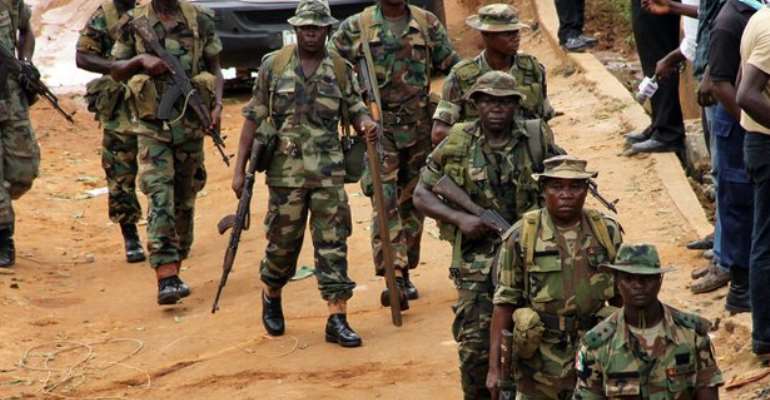The Nigerian Military And The Fight Against Terrorism

It is heart lifting to receive the news of the triumph of the Nigerian Army against the dreaded group, Boko Haram. This is coming at the time when public support for, and the confidence in, the Military is at all-time low. We can only pray for more morale for these young men working day and night to defend our dear nation.
Given this background, it is pertinent to remind us of the issues raised by Boko Haram activities in the North Eastern part of Nigeria. The memories of over 10,000 lives lost to nefarious activities of this group are still with us. Over 200 Chibok girls are still with their abductors. We can still hear the cries of the internally displayed persons (IDP). What better time do we then have to have a national military debrief?
Holding a debrief is a standard military practice in advanced countries, even during a war. There was a national military debrief, in full public glare as recently as the 2006 Lebanese war following the kidnap of Israeli soldiers, and subsequent attacks on Israel by the group, Hezbollah. For some people, setting up a commission amidst fighting was a dubious, questionable decision given the distractions it portends on the military hierarchy. In Israel, the debrief is as important as the fighting!
Also, after the Iraqi invasion controversy in 2003, the Westminster government set up the Chilcol Inquiry, also known as the Iraqi Inquiry to look at the role of the British army in the debacle. Therefore, military debriefing is not an unusual affair, except if we decide to make it so.
Sometimes in 2014, about 97 soldiers faced the Court Marshal for various offences that could be classified as mutiny. While we agree that disciple, order, doctrine and combat readiness are the hallmark of the Nigerian military, we mustn’t turn a blind eye to the germane issues raised concerning institutional decay and corruption within the military High Command by these unfortunate fighters.
One is left to wonder how foot-walking local hunters in Michika, Mubi and many parts of north eastern Nigeria record more successes against the Boko Haram than the army. One is still left to wonder why the lesser-trained Chadian, Cameroonian and the Niger armies will have to come to the aid of the almighty Nigerian army in battle against Boko Haram. These issues should bother all patriotic Nigerians. A military debrief would have revealed all these and saved us of the monumental embarrassment caused by the “exposition” of the helpless and hapless soldiers.
We are aware some people will raise eyebrows about our proposal for a national military debrief at this time. These people will raise their most potent argument- the debrief will distract the soldiers from their primary duties. It was this same argument that was used to justify the military’s unpreparedness for the February 14 presidential election before it was shifted to March 28. But these same people did not find anything unusual in the Court Marshal of 97 soldiers in the heat of the military onslaught against Boko Haram. It was alright for soldiers insisting on military standards, professionalism and best practices to be executed but the issues they raised are secondary. What a country!
As against the familiar, if our proposal will be accepted, the Nigerian military must consider making some ground-breaking changes. It must consider changes in its orientation and doctrine. It must be willing to sacrifice discipline for flexibility; organisation for initiative; and predictability for innovations. These must also be included in the terms of reference for the proposed national debrief.
In addition, we suggest our sailors, soldiers, and pilots should be kept busy either in peace or battle. Idleness is lethargic. Use makes functions. Whatever is unsused is either misused, underused or abused. In peacetime, our soldiers should be used for physically-demanding jobs like road construction, bridge building, farming in the rural areas and other socio-economically beneficial duties. Apart from the physical benefits the bring to our fighters, these tasks prepares our soldiers , it prepares them mentally for battle. This also boosts good civil-military relations.
This may appear strange to some people but it was practised in Tanzania in the 1970s which successfully kept the soldiers busy effectively after the unsuccessful mutiny in the army in 1964. This explains why Tanzania is one of the few countries in Africa that never fell into military misadventure. No one needs to be told that the successful Tanzanian army invasion which disposed Idi Amin’s dictatorial regime(Uganda) in 1979 was thanks to the excellent training and leadership in the poorly-equipped Tanzanian army.
In other to have our military perform optimally and professionally, we must first insist on having a full national military debrief or a public commission of inquiry to trace the root cause of underperformance of the army in recent times in face of Boko Haram’s onslaught leading to the loss of lives of untold thousands; rendering many homeless and permanently incapacitating millions.
ABOUT THE AUTHOR
Olalekan Waheed ADIGUN is of many parts. He is a writer, philosopher, politician, academic, dramatist, poet, psephologist, political strategist and researcher.
His write-ups can be viewed on his website http://olalekanadigun.com/
Tel: +2348136502040, +2347081901080
Email: [email protected]
[email protected]
Twitter @adgorwell
